It is always great to see teardowns of new products, especially when they are of Sony's products. Audio52 performed a full teardown of the new WF-1000XM3 recently, so let's take a look at what they found out. I will mention none of the photos work for me on their website so I had to use photos from this website. The second link provides an English translation although it might be Google translated from the original article, regardless, the photos from the teardown provide a great deal of insight into the new headset and possibly future devices.
I will not be posting all of the teardown photos here but only a selection, the rest can be found at the links I posted above. The FCC documents, specifically the internal photos do not reveal much since the photos are low resolution and the charging case was not shown, so no chip details, codes or battery capacity could be discovered. The Audio52 teardown starts with the charging case but I will skip most of that and focus first on the charging case board.
Unfortunately there is no HDX code on the case PCB or anywhere else on the rest of the parts, including the earpods and I just wanted to see the code to compare it to the code from the Bluetooth certification to confirm it. The teardown does provide the battery capacity in more details than just 3.7V that was on the FCC documents, 700mAh/2.59Wh. A decent capacity and a nice increase from the previous model which had a built in battery of 470mAh/1.739Wh, this is almost 1.5x more capacity. Sony states that charging case can recharge the earbuds up to 3 times, so it seems each time you recharge the earbuds using the case, you use roughly 230mAh, which would mean 115mAh per earbud. I am not entirely sure if that is how it works, maybe some can correct me in the comments.
Now to move onto the earpods themselves. From the photos, it is clear that these are not sealed to any major extent to restrict any water/sweat from entering the interior. There does appear to be a lip on the cover but it seems to be plastic, not rubber, so liquid could still enter the earpods if they are exposed to a significant amount of liquid. I could be wrong and there might be some rubber there but the Google translation feels wrong, so if anyone is able to translate this correctly, 耳机上盖使用卡扣固定, that would be great. The microphone hole is covered on the inside with what appears to be a foam pad to prevent any dust entering, but it would not help with liquid damage. These are not sport headphones and should not be expected to have any significant water/dust resistance but I do hope for users and Sony's sake, water damage from normal use due to sweat does not become a problem.
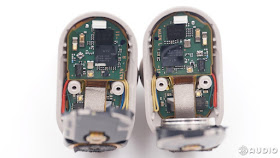 Time to dive into the inside of the earpods. The photo on the right shows how little space there is inside and how much Sony packed in there. This would limit how many chips Sony could add to the boards and might be one of the reasons why both LDAC and aptX are be missing. Dedicated codec decoders would require space which might be needed for other components like power management, the battery, etc. Sony could have made the battery smaller in order to fit in more chips but reducing battery life would be a bad idea, especially if it was less than the previous model. While I would have liked to have seen aptX or at least LDAC support, sacrificing battery life or the removing noise cancellation would not be a good trade off. Perhaps in future models Sony might be able to combine some chips together and add in LDAC support, like the NC chip with codec decoders, but I am not an electronics engineer and have no idea if that is even possible.
Time to dive into the inside of the earpods. The photo on the right shows how little space there is inside and how much Sony packed in there. This would limit how many chips Sony could add to the boards and might be one of the reasons why both LDAC and aptX are be missing. Dedicated codec decoders would require space which might be needed for other components like power management, the battery, etc. Sony could have made the battery smaller in order to fit in more chips but reducing battery life would be a bad idea, especially if it was less than the previous model. While I would have liked to have seen aptX or at least LDAC support, sacrificing battery life or the removing noise cancellation would not be a good trade off. Perhaps in future models Sony might be able to combine some chips together and add in LDAC support, like the NC chip with codec decoders, but I am not an electronics engineer and have no idea if that is even possible.
Anyways, here is the list of most the major chips on the boards:
- Mediatek MT2811SP
- Q128FWY - memory chip
- D3781835 - Sony's QN1e NC chip
- 310819078266C - unknown
- PK++ - unknown
- E4MW - unknown
- 421E41R9 0RT7G621 - supposedly a battery protection chip
- T260 MbGS
- Mediatek MT6388P - power management chip (under the shield cover)
I am not sure if all of these are correct, I have copied some of the information from the translated article and others from googling them, like the memory chip, but the rest are unknown. If anyone has any actual information what the rest of the chips do, please leave a comment below.
Update
Some more in-depth look at the parts, thanks to the kind user in the comments.
This seems logical and most likely the case. Sony's site does state "Note: The image of code printed on top of the package has been manipulated", so perhaps 3775A_13Z is in reality the CXD3775AGF.
Update
Some more in-depth look at the parts, thanks to the kind user in the comments.
Regarding the Sony QN1e Noise Cancelling Processor:
The website for Sony semiconductors (see Link 1) has only one listing for an "Audio CODEC IC", the CXD3775AGF (see Link 2). There is a photo of that IC with an etched ID number of 3775A_13Z. The linked images in this article for the WF-1000XM3 headphones show a QN1e IC with an etched ID number of D3781_835. If the CXD3775AGF has an etched ID number of 3775A_xxx, then the QN1e's etched number of D3781_xxx might correspond to a part number of CXD3781AGF.
This seems logical and most likely the case. Sony's site does state "Note: The image of code printed on top of the package has been manipulated", so perhaps 3775A_13Z is in reality the CXD3775AGF.
I couldn't find any info for an exact-match CXD3781AGF search, but I did find a webpage (see Link 3) that lists a "Sony Audio CODEC" with a really-close part number of CXD3781GF. One of the specifications of the CXD3781GF is "Hybrid Noise Canceling for Truly Wireless". On Sony's webpage for the WF-1000XM3 headphones, one of the WF-1000XM3 "Key Features" is "Truly Wireless Technology" (see Link 4).
The chip in question is quite small, 3.4mmx3.4mm, perfect for a small in ear headset like the WF-1000XM3.
There are two other wireless headphones that Sony lists under the "Truly Wireless" category (see Link 5) other than the WF-1000XM3: The WF-1000X and the WF-SP700N, both of which are lower priced models that don't mention the QN1e on their respective pages. The CXD3781GF lists "Hybrid Noise Cancelling" as one of its features. I'm not sure what "Hybrid" Noise Cancelling (NC) means, but if it is the same as "Dual" NC, then Hybrid/Dual NC might point to the WF-1000XM3 which has two NC mics per headphone. The other two models only have singe mics for NC.
It does seem that both the WF-1000X and WF-SP700N only have one NC mic, s
Update 2: So the WF-1000X does not appear to have any CXD chip in it, just the CSR 8675 from Qualcomm which I am guessing is being used for NC. WH-1000XM3 does not use the CXD3775F, instead the QN1 (CXD90050).
Nothing definitive, but I think the "Truly Wireless" headphones probably use an IC from the CXD378x family (if there is more than one), possibly the CXD3781GF. Something to look out for.
I agree, but an excellent assessment and analysis nonetheless.
Links:
(1) https://www.sony-semicon.com
(2) https://www.sony-semicon.com/en/products/lsi-ic/audio.html
(3) https://www.sunnic.com/english/01_product/02_brand_detail.php?AID=94
(4) https://www.sony.com/electronics/truly-wireless/wf-1000xm3#trulywireless
(5) https://www.sony.com/electronics/headphones/t/truly-wireless-earbuds
In an earlier post, I speculated that the WF-1000XM3 was using either a Mediatek or Airoha BT/SoC chip from the information in the BT cert (AB15abx, MT28abx) and now the teardown confirms that it is the Mediatek MT2811SP (see below). This is the first time a Mediatek chip has been used in a wireless headphone from Sony as far as I know, but not the first time in a Sony device, since the Walkman line has been using Mediatek SoCs for a while now.
Unfortunately searching for the SoC on Google or Mediatek's site yields nothing specific, so this is puzzling. From my understanding, current Mediatek chips have the company name, Mediatek written out in full and not abbreviated to MTK. But I have seen photos online of the MT6166V and MT6628Q, both with MTK branding, so perhaps the full Mediatek branding is only for SoCs? Just a guess on my part. Contacting Mediatek did not result in any replies so this leaves one more theory, the MT2811 is not a Mediatek chip but an Airoha chip rebranded as MTK chip.
I have no real solid evidence backing this up, apart from the Bluetooth certification where it has both the MT28xx and AB15xx as one certification and the MT28xx is described as "Airoha BT chipset ABwxyz BT5.0 BB/LM/LL/RF/RF-PHY/HCI", so perhaps this might support the rebranding hypothesis. Perhaps if anyone knows more, please leave a comment below. So while this teardown answers the SoC question, it does raise further questions regarding the MT2811 and what it is exactly.
Sony QN1e
Last year after IFA 2018, I made a post asking if the QN1 in the WH-1000XM3 was real or a marketing gimmick. Well the chip turned out to be real, even branded as a Sony chip and it appears a similar situation is present in the WF-1000XM3.
This is the photo Sony released in their press release and has on their WF-1000XM3 product page to highlight the new QN1e chip and its benefits. The teardown provides a nice view of the actual NC chip, although not labelled as the QN1e on the chip or sporting Sony branding.
The chip, the D378183, can be seen here on the left side of the board and yes it does not match Sony's photo 100% but that is because Sony's photo is from the left earbuds board, where as the teardown photo shows the right side (see R3 in the casing). The only photo to show the left board with the chip is higher up in the post but cropping and zooming in shows the chip more like Sony's press photo.
Seems like some transistors and parts are missing from the press photo versus the real photo but that is to be expected. The press photo is either a digital render or maybe a pre-production/prototype but it is close enough.
As for any other future products, I recently posted about a new wireless headset, the HDX-2941, and this device uses the same BT chip as the WF-1000XM3, the MT2811. So while not confirmed, we might be looking at the WI-1000XM2 that recently showed up on the FCC or perhaps the new upcoming WH-H910N. Regardless of which device it is, hopefully Sony will add LDAC support and possibly aptX but we will only know once they are released. While I still do not know which device the HDX-2941 is, we now do know the WI-1000XM2 will have LDAC support as supported by the reference manual.
So there you have it, a brief overview of some of the details of the teardown, I do encourage people to check out the rest of the photos, links below, to see the rest of the teardown. If anyone has anymore details on the various chips, please a leave a comment or link below.
Source 1 | Source 2


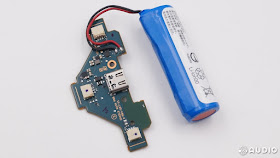
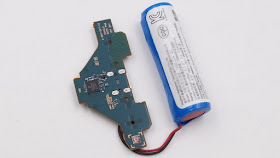
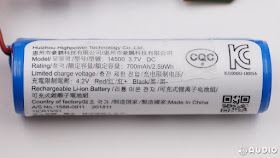
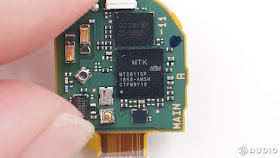
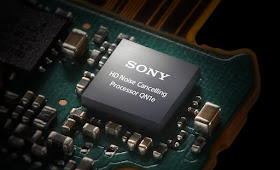
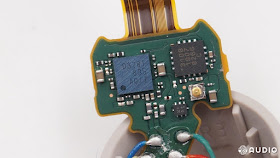

For
ReplyDelete> 耳机上盖使用卡扣固定
I will translate it to
> The earphone back cover is locked with buckles
耳机 = earphone / headphone
上盖 = cap / lid / cover
使用 = use
卡扣 = buckle
固定 = fasten / fix
Ok I understand what it means now, thanks much appreciated.
DeleteThe images on 52audio.com didn't load for me either, but if I right-clicked each broken image placeholder, I could "view image" (using Firefox) and then each image would display correctly.
ReplyDeleteRegarding the Sony QN1e Noise Cancelling Processor:
ReplyDeleteThe website for Sony semiconductors (see Link 1) has only one listing for an "Audio CODEC IC", the CXD3775AGF (see Link 2). There is a photo of that IC with an etched ID number of 3775A_13Z. The linked images in this article for the WF-1000XM3 headphones show a QN1e IC with an etched ID number of D3781_835. If the CXD3775AGF has an etched ID number of 3775A_xxx, then the QN1e's etched number of D3781_xxx might correspond to a part number of CXD3781AGF.
I couldn't find any info for an exact-match CXD3781AGF search, but I did find a webpage (see Link 3) that lists a "Sony Audio CODEC" with a really-close part number of CXD3781GF. One of the specifications of the CXD3781GF is "Hybrid Noise Canceling for Truly Wireless". On Sony's webpage for the WF-1000XM3 headphones, one of the WF-1000XM3 "Key Features" is "Truly Wireless Technology" (see Link 4).
There are two other wireless headphones that Sony lists under the "Truly Wireless" category (see Link 5) other than the WF-1000XM3: The WF-1000X and the WF-SP700N, both of which are lower priced models that don't mention the QN1e on their respective pages. The CXD3781GF lists "Hybrid Noise Cancelling" as one of its features. I'm not sure what "Hybrid" Noise Cancelling (NC) means, but if it is the same as "Dual" NC, then Hybrid/Dual NC might point to the WF-1000XM3 which has two NC mics per headphone. The other two models only have singe mics for NC.
Nothing definitive, but I think the "Truly Wireless" headphones probably use an IC from the CXD378x family (if there is more than one), possibly the CXD3781GF. Something to look out for.
Matt
Links:
(1) https://www.sony-semicon.co.jp/
(2) https://www.sony-semicon.co.jp/products_en/audio_ic/index.html
(3) https://www.sunnic.com/english/01_product/02_brand_detail.php?AID=94
(4) https://www.sony.com/electronics/truly-wireless/wf-1000xm3#trulywireless
(5) https://www.sony.com/electronics/headphones/t/truly-wireless-earbuds
Fantastic analysis, may I add it to the post with credit of course?
Deletebtw I posted a teardown of the upcoming WI-1000XM2, it has a few similar chips and some other new ones.
https://thewalkmanblog.blogspot.com/2019/08/sony-wi-1000xm2-revealed-via-certs.html
Feel free to add any of the info to your blog post. No credit necessary, just an "anonymous" commenter.
ReplyDeleteI've enjoyed your blog for years (since the Walkman forum on AnythingButIpod was active). Thanks for all of the work that you've put into it.
Hello i need to know what type of female usb-c the charging box has on cause i need to replace it
ReplyDeletetype? you mean usb type-C?
Deletecheck here for parts, https://sony.encompass.com/search?searchTerm=wf1000xm3
close up shot https://imgur.com/wQnsSxL